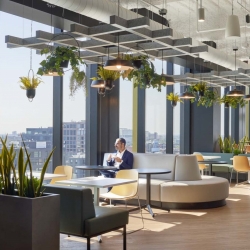July 25, 2023
Office lease lengths may be decreasing but majority of firms will increase their footprint
 Responding to reports from property management platform, Re-Leased, that UK office lease lengths has fallen to the lowest on record and that vacancies rates had soared, office designers Unispace are suggesting firms should be wary of making ‘rash decisions’ regarding their office footprint over the long term. A study published by the firm – Returning for Good – which surveyed 9,500 employees and 6,650 employers from 17 countries worldwide – claims that while employees in the UK spend the least amount of time in the office compared to any other country, there is an expectation that this will increase as workers face limited access to career progression opportunities while working remotely. (more…)
Responding to reports from property management platform, Re-Leased, that UK office lease lengths has fallen to the lowest on record and that vacancies rates had soared, office designers Unispace are suggesting firms should be wary of making ‘rash decisions’ regarding their office footprint over the long term. A study published by the firm – Returning for Good – which surveyed 9,500 employees and 6,650 employers from 17 countries worldwide – claims that while employees in the UK spend the least amount of time in the office compared to any other country, there is an expectation that this will increase as workers face limited access to career progression opportunities while working remotely. (more…)











 A new poll of people aged between 35 and 55 suggests that most workers expect to retire at around 62 years old, four years earlier than the UK state pension age of 66. The report called
A new poll of people aged between 35 and 55 suggests that most workers expect to retire at around 62 years old, four years earlier than the UK state pension age of 66. The report called 


 A recent survey conducted among LABS members shows that the physical office space still has a valuable place in the mindset of how they want to work. More than seven in ten of those questioned said the office is a strategic device for their businesses, and more than 74 percent of members questioned use the office for two days or more per week.
A recent survey conducted among LABS members shows that the physical office space still has a valuable place in the mindset of how they want to work. More than seven in ten of those questioned said the office is a strategic device for their businesses, and more than 74 percent of members questioned use the office for two days or more per week.


















June 1, 2023
Resenteeism. Destructive, contagious and in your workplace right now
by Stephanie Fitzgerald • Comment, SF, Wellbeing, Workplace